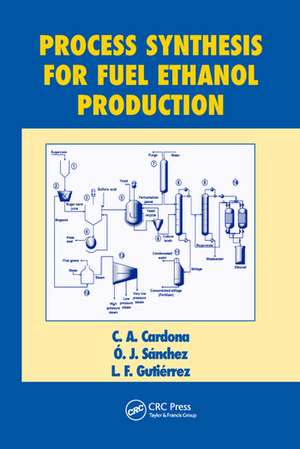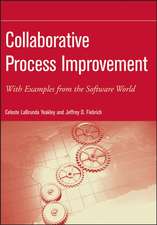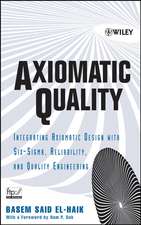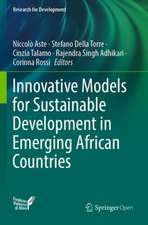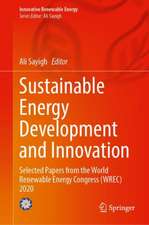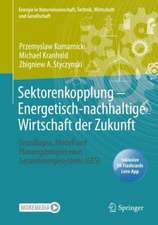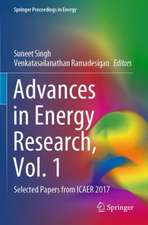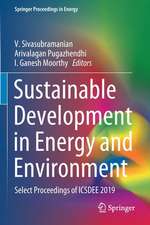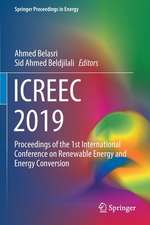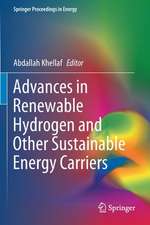Process Synthesis for Fuel Ethanol Production: Biotechnology and Bioprocessing
Autor C. A. Cardona, O. J. Sanchez, L. F. Gutierrezen Limba Engleză Paperback – 30 iun 2020
Drawing on the authors’ more than 15 years of process engineering and ethanol research, the book first focuses on liquid biofuels, before examining the role of process synthesis in the rapid and high-tech analysis and design of complex biotechnological processes. It then describes various types of feedstocks, including sugars, starchy crops, lignocellulosic biomass, and microorganisms, as well as hydrolysis technologies, such as saccharification. The authors cover the fuel ethanol production technologies for different feedstocks, the new technological innovations based on process integration to reduce energy consumption, and the environmental issues of bioethanol production. They also discuss the technological configurations for fuel ethanol production in the industry and the possible factors affecting food security with fuel ethanol production and consumption.
Supported by case studies that include calculations and discussions of results, this book uses a process engineering approach to explore the analysis and development of fuel ethanol production from different feedstocks. It shows how accurate analysis and precise design, along with responsible government policies, can lead to fair and sustainable development of energy crops worldwide.
| Toate formatele și edițiile | Preț | Express |
|---|---|---|
| Paperback (1) | 440.61 lei 6-8 săpt. | |
| CRC Press – 30 iun 2020 | 440.61 lei 6-8 săpt. | |
| Hardback (1) | 1046.65 lei 6-8 săpt. | |
| CRC Press – 3 dec 2009 | 1046.65 lei 6-8 săpt. |
Din seria Biotechnology and Bioprocessing
- 18%
 Preț: 1830.48 lei
Preț: 1830.48 lei -
 Preț: 489.26 lei
Preț: 489.26 lei - 22%
 Preț: 370.94 lei
Preț: 370.94 lei - 15%
 Preț: 489.26 lei
Preț: 489.26 lei - 15%
 Preț: 489.26 lei
Preț: 489.26 lei - 15%
 Preț: 489.26 lei
Preț: 489.26 lei - 15%
 Preț: 491.39 lei
Preț: 491.39 lei -
 Preț: 450.79 lei
Preț: 450.79 lei - 15%
 Preț: 489.45 lei
Preț: 489.45 lei - 18%
 Preț: 1234.68 lei
Preț: 1234.68 lei - 18%
 Preț: 1555.85 lei
Preț: 1555.85 lei - 18%
 Preț: 2910.54 lei
Preț: 2910.54 lei - 18%
 Preț: 1934.26 lei
Preț: 1934.26 lei - 15%
 Preț: 499.11 lei
Preț: 499.11 lei - 5%
 Preț: 1308.48 lei
Preț: 1308.48 lei - 18%
 Preț: 1216.29 lei
Preț: 1216.29 lei
Preț: 440.61 lei
Nou
Puncte Express: 661
Preț estimativ în valută:
84.31€ • 88.26$ • 69.76£
84.31€ • 88.26$ • 69.76£
Carte tipărită la comandă
Livrare economică 05-19 aprilie
Preluare comenzi: 021 569.72.76
Specificații
ISBN-13: 9780367577209
ISBN-10: 0367577208
Pagini: 416
Dimensiuni: 152 x 229 x 23 mm
Greutate: 0.56 kg
Ediția:1
Editura: CRC Press
Colecția CRC Press
Seria Biotechnology and Bioprocessing
ISBN-10: 0367577208
Pagini: 416
Dimensiuni: 152 x 229 x 23 mm
Greutate: 0.56 kg
Ediția:1
Editura: CRC Press
Colecția CRC Press
Seria Biotechnology and Bioprocessing
Cuprins
Biofuels. Process Design and Role of Process Synthesis. Feedstocks for Fuel Ethanol Production. Feedstock Conditioning and Pretreatment. Hydrolysis of Carbohydrate Polymers. Microorganisms for Ethanol Production. Ethanolic Fermentation Technologies. Analysis of Ethanol Recovery and Dehydration. Integrated Processes for Fuel Ethanol Production. Environmental Aspects of Fuel Ethanol Production. Technological Configurations for Fuel Ethanol Production in the Industry. Food Security versus Fuel Ethanol Production. Perspectives and Challenges in Fuel Ethanol Production. Index.
Notă biografică
C.A. Cardona is an associate professor of chemical engineering in the Pilot Plants of Biotechnology and Agroindustry at the National University of Colombia in Manizales. He is also a consultant in bioenergy and development for the Food and Agriculture Organization of the United Nations in Rome, Italy.
O.J. Sanchez is an associate professor of food engineering in the Institute of Agricultural Biotechnology at the University of Caldas in Manizales, Colombia.
L.F. Gutierrez is an assistant professor in the Department of Engineering at the University of Caldas in Manizales, Colombia.
O.J. Sanchez is an associate professor of food engineering in the Institute of Agricultural Biotechnology at the University of Caldas in Manizales, Colombia.
L.F. Gutierrez is an assistant professor in the Department of Engineering at the University of Caldas in Manizales, Colombia.
Descriere
This book is a comprehensive guide to the design and analysis of the most advanced technologies for fuel ethanol production from feedstocks. It describes how process systems engineering can be applied to fuel ethanol production to achieve new levels of efficiency according to technical, economic, and environmental criteria. The authors cover liq
